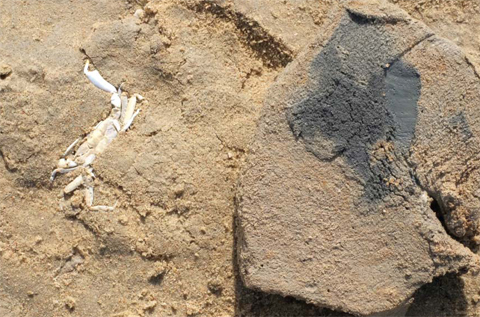 His goal was to teach me something I didn't know. Something scientific yet enchanting. How oil is being formed over millions of years and why the land of Kuwait is a fertile environment for the most famous natural resource and continues to provide the world with oil. Many people mistakenly think that oil is a product of the decomposition of the bones of dinosaurs and trees. Bones, the trees and leaves turn to coal. On this part of Kuwait (Kuwait Bay) where sea meets the desert lives an open laboratory for the miraculous production of oil. My brother, Dr Arafat Alshuaibi, an assistant professor in geology at Kuwait University, took me in a one hour trip to Subaiya desert to discover Kuwait Bay. However, what I've discovered was something beyond sand and oil.
His goal was to teach me something I didn't know. Something scientific yet enchanting. How oil is being formed over millions of years and why the land of Kuwait is a fertile environment for the most famous natural resource and continues to provide the world with oil. Many people mistakenly think that oil is a product of the decomposition of the bones of dinosaurs and trees. Bones, the trees and leaves turn to coal. On this part of Kuwait (Kuwait Bay) where sea meets the desert lives an open laboratory for the miraculous production of oil. My brother, Dr Arafat Alshuaibi, an assistant professor in geology at Kuwait University, took me in a one hour trip to Subaiya desert to discover Kuwait Bay. However, what I've discovered was something beyond sand and oil.
As soon as we arrived, I heard a welcoming hymn sung by the wind. It was as tranquil as a children's choir. One long exhale came out of me and with it all the tension. The first thing I said to my company was: "Thank You". "Enjoy" He replied. "But don't be tricked by tranquility, millions of creatures are working every single second for the future of earth and for humanity. Then, he tried to squeeze his knowledge in order to give me a simple, layman's explanation of an intricate scientific process: how oil is formed/
The chemical processes
"When phytoplankton, cyanobacteria, algae and other marine organisms die, they drift to the seafloor, collectively forming sedimentary drifts of decaying organic matter. These get lodged in places where tectonic plates are subsiding. Over time, more sediment layers accumulate, the bottom layers containing the previously mentioned organisms will be compacted bearing down on them. Over geologic time, turning up the heat catalyzes the chemical processes that cause extremely heavy and complex molecules called kerogens to assemble from the dismantled components of organic molecules.
These kerogens, along with long-lasting lipids and scant leftover bits of cell wall, make up the raw material that will turn into petroleum/oil. Oil will migrate upward through rocks porosity (such as sandstone) or in areas where the pressure is low until it is trapped or sealed by a non-porous layer (such as evaporites, ie, salt)." Dr Alshuaibi added: "Kuwait Bay has great potential for forming oil after millions of years. If the rhythmic, interlayered cyanobacteria (the greyish zone) and the sand sediments (the reddish zone) is subjected to burial, eventually kerogens will form. Subsequently, oil will form."
The skeletons of numerous marine creatures and shells lay scattered over the muddy land. But, finding a skeleton of a stingray was beyond my expectations. No wonder that the whole area smelled like fish. Kuwait Bay is also inhabited by mudfish, birds, crabs, worms, and a strange shellfish that seemed to look like cigarette butt ends. And if you carve into the mud, you will notice tidy layers of shades of grey. And if you try to play with a piece of mud, you will find it so elastic yet coherent. It felt like playing with a stress ball. For the first time of my life, I felt that our national wealth goes beyond the concept of an energy source and can expand to a psychological and spiritual value for someone like me. Someone who needed a break from everything, from the stress of the city.
When you feel that the air of the world is not enough to breathe, when you feel that your steps are markedly sluggish while everyone around you is moving forward, when you feel that the Earth's gravity draws you down, do not resist. Go down and listen well, perhaps it's been inviting you to a date in a place far away. Far to the degree of isolation that enables you to hear the voices of harmonious creatures, playing melodies and vibrant work without complaint nor boredom since the beginning of creation. accept the invitation and go on explore. Do something you have never done before leaving behind all the congested roads, ticking clocks and do-lists. A good cup of coffee and a windproof jacket is all you need to make your date with earth complete.
By Athoob A Al-Shuaibi
.jpg)
